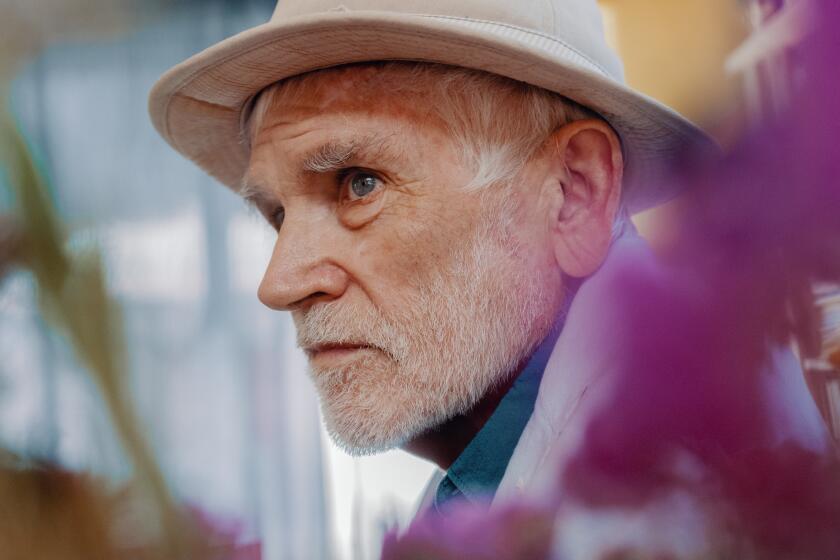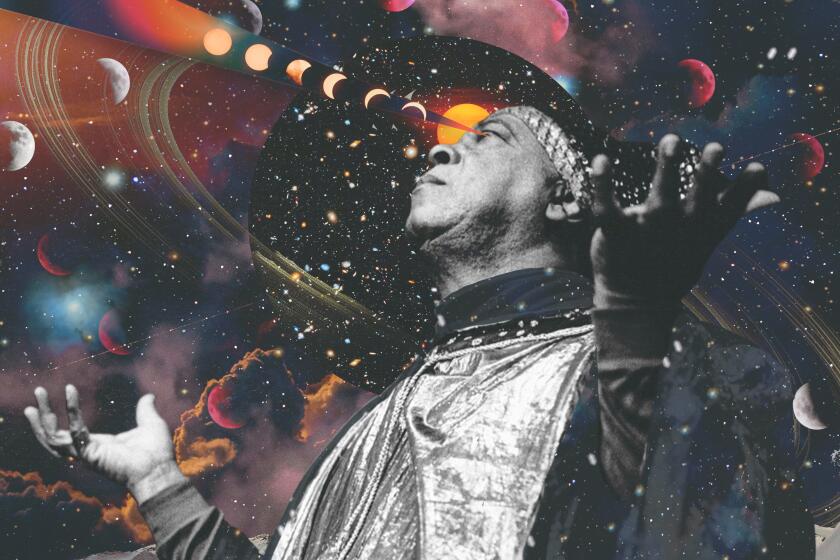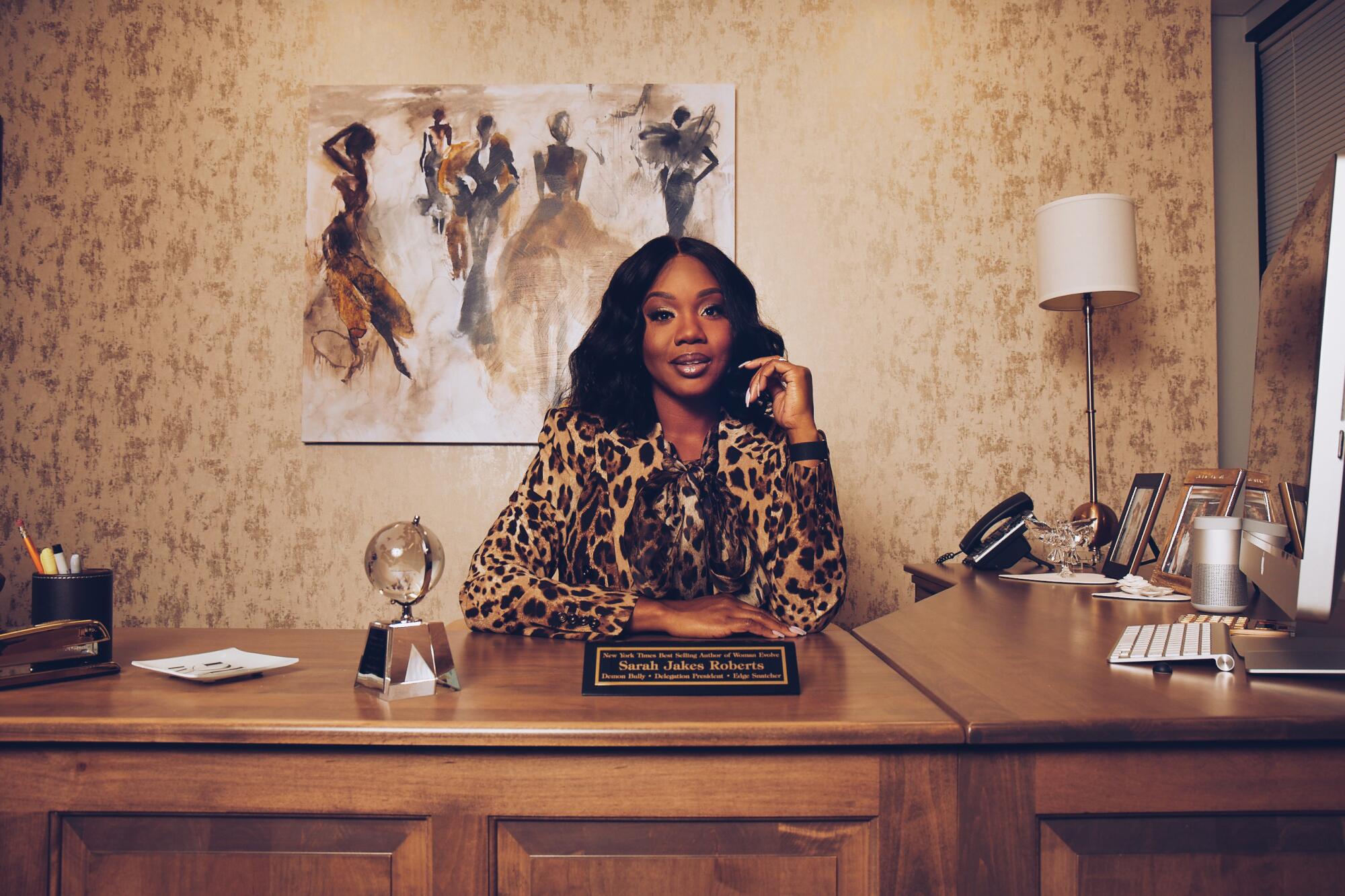
- Share via
This story is part of Image issue 12, “Commitment (The Woo Woo Issue),” where we explore why Los Angeles is the land of true believers. Read the whole issue here.)
I remember the first time I really experienced Pastor Sarah Jakes Roberts in full effect. I had seen her before, on my Instagram feed. Activists, poets, reality television stars, marketing gurus, fashion designers, television producers, hairstylists, beauty and fashion influencers — all Black women from different sectors of my life — were following her. I took note. But I didn’t encounter her on an intimate level until I was sitting in a chair getting my hair braided at a salon in Gardena, and Roberts appeared on a YouTube video playing on the flatscreen TV.
The title of the sermon was “Breaking Point.” In it, Roberts talked about the moment when one hits that threshold and what to do about it. But before she could really get going, a person in the audience shouted her name in admiration. “I pay someone to do that in every city I go to,” Roberts joked. “I got your Venmo, girl. I got you after service. Half now, half after she accomplishes the task.”
If you know Roberts — if you are one of 2 million people following her on Instagram, or have watched her livestreamed podcast, or have been to a service at ONE, where she co-pastors with her husband, Touré Roberts — you would recognize the form. Roberts often begins her talks with a joke — something relatable or funny — as an offering to the audience, before narrowing in on the message with precision. But it’s not all technique; it’s what she says as well. She tells stories by anchoring them in the relatable, in language that lets the congregation know she’s on their level.
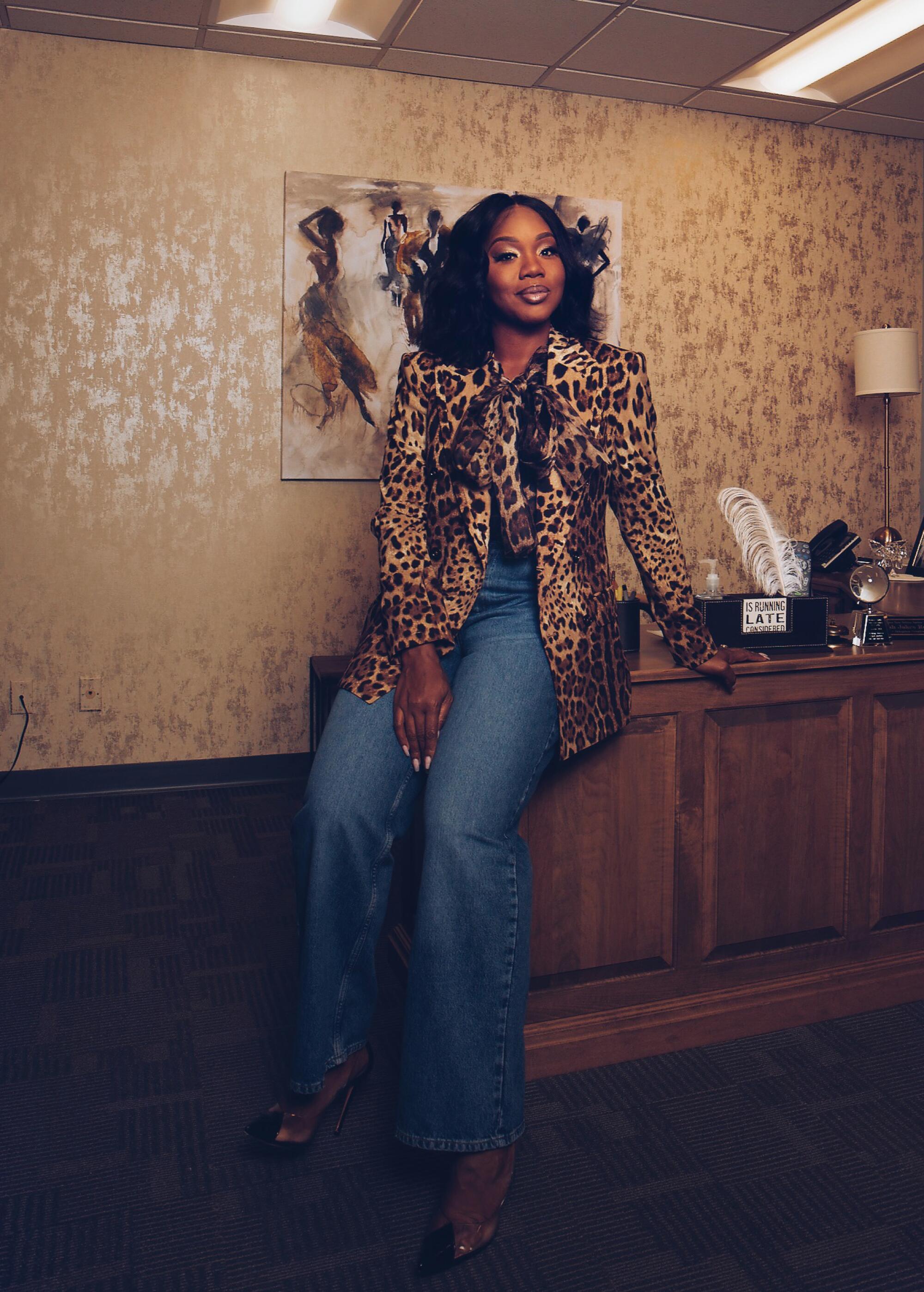
Many spiritual leaders invoke their personal travails as teachable “but then I found my lord and savior, Jesus Christ” moments. But Roberts isn’t part of the old wave. Her hairstyle is flawless, her tailored jumpsuits hit, her makeup is always camera-ready; but as a teenage mom and the second youngest child of renowned Bishop T.D. Jakes and First Lady Serita Jakes, she will be the first one to tell you that she didn’t expect to be the one people pay attention to. “It’s just such a departure from, I think, how I thought my life would be,” she tells me. “I’m naturally introverted. So, the idea that people are using my voice for TikTok things or my face or messages go viral, it’s just, I don’t know.
“God puts you in situations that you’d never place yourself in. And I think that my life feels like evidence of that every day. So I’m just trying to like, honor it.”
ONE is located in the old ARC Theater, close enough to the corner of La Brea and Melrose that you can see the line at Pink’s Hot Dogs from the entrance but not the hypebeasts thrifting down the block or waiting for the latest drop. On any given Sunday (more so before the pandemic), you will spot many a Black creative walking inside — not to mention a celeb or two. The congregation includes Stevie Wonder, Angela Rye, Common and Miss Tina Knowles, among others.
In addition to preaching at ONE, Roberts heads Woman Evolve, an organization she founded in 2017. In May, I met Roberts at the Women Evolve offices, a few weeks before she was set to embark on a seven-city tour to speak to women across America. She was filming an episode of her podcast when I arrived. She wore a tan, short-sleeved shirt, dark-wash ripped jeans and camera-ready makeup. We sat down in her office at a round table where one of those giant, turquoise gallon water bottles was already placed. Behind the desk was a brown Telfar shopping bag perched on a chair. Sitting up straight, manicured hands on her lap, wide-eyed, she has a studious nature to her.
Roberts has been in the public eye for two decades. She was born in West Virginia and grew up in Dallas. As her father was building his Potter’s House empire, broadcasting on the radio, publishing bestselling books, rewriting the playbook for spreading the gospel and building a global ministry, Roberts was enjoying the simplicities of Christian adolescence — sitting in the pews of the Potter’s House with a group of friends, trading in the normal currency of teen life: relationships, sex and whose CD you just copped. That would change when she was 13; around the time her father appeared on the cover of Time under the headline “Is This Man the Next Billy Graham?” Roberts got pregnant.
You probably have so many questions. The details are outlined in her first of four books, “Lost & Found,” released in 2014. How many months did she wait before telling her parents? Three. The young boy who was the father was a year older than she was and attended Potter’s House. Roberts’ parents found out through her older sister, who sent a letter to their mailbox — a sure sign it was her as they received personal mail to a P.O. box, not their home. The initial response from her family was mostly silence. T.D. Jakes has never shied away from his position on abstinence, but he is also the author of “Women Thou Art Loosed” and has hosted 25 years of a conference that’s taught women how to break out of their shell and past trauma.
At 14, Roberts gave birth to a son. Immediately, she focused on recovering from what she was made to feel was a mark of shame. “My perception after I got pregnant was that I was disqualified from favor, from anointing, from being used. Everything communicated that to me: We don’t want you in the kids group. We don’t want our other kids around you. Pregnancy is contagious. It just made me feel like I had no use. So I say all of that to say, when I started speaking, I wasn’t speaking from this place of confidence, like I have something to say. It was more like God, if there’s anything you want to say, sure, I’ll try.”
She finished high school early and then decided to attend Texas Christian University to study accounting. “When I got pregnant with my son, all I wanted was job security,” Roberts recalls. “And for me, growing up in church, I was inclined towards service. I didn’t necessarily think, ‘I’m going to be a boss.’ I wanted to be an administrative assistant. I felt like that would be the best path. I like organizing things. I like getting in the weeds and details of how to make things work.”
At Texas Christian, Roberts met her future first husband — a linebacker named Robert Henson, who would transfer to TCU before going on to play for the Washington Redskins. They married in 2008 in a Cinderella-themed wedding, featuring a toast by Tyler Perry, a close family friend, a glass slipper ice sculpture and a Carl Thomas “Summer Rain” serenade.
The marriage lasted only four years; Roberts, who had legally changed her name to Henson, filed for divorce in 2012, citing infidelity. She had started blogging in 2010 and wrote blog posts attempting to make sense of her own life and broken marriage. “I was really expressing anger, pain, insecurity,” she tells me.
In her mind, she had no reputation to lose; she had already lost it. “At that time, nobody really cared what I did, because I had been pregnant. I was never at church all the time. I was a waitress at the strip club. So I was already … what do they call it? The black sheep. I didn’t care if anybody saw because they wouldn’t be surprised that I would be writing these things, because no one has any more expectations of me,” she says. “I had gotten so sick of feeling ashamed and acting from that shame. Being angry, acting from the angry pain. The consequences for those decisions, whether the consequence within the form of a relationship or, quite literally, almost being arrested and having to go to the CPS office to fight for the right to keep my kids. I just felt like, OK, maybe I’m ashamed. Maybe I didn’t do everything the right way. But I can do better than this. And that one thought changed everything for me.”
Blogging was more than cathartic; it was a means through which she began figuring out who she was — and who she wanted to be — in public. She had started writing (as Sarah Henson, not Sarah Jakes), thinking there was nothing particularly inspiring about her life. That no one would care about the messy details. But by the time of the divorce, the blog had already garnered a sizable following. Roberts started getting invited to address women’s groups as a motivational speaker. She also started a podcast about “where faith and culture collide,” in which she would discuss the topics that interested her, like Burberry suing Target or her new favorite Beyoncé song, through the POV of a Black, modern Christian woman. Headphones on, mic to the side, she would sit in front of her open laptop, simultaneously reading comments and sharing her opinions; watching her, she seemed more like a news broadcaster than a self-help guide.
In 2014, Roberts was introduced to her now-husband, Touré Roberts, through a friend shortly after the release of “Lost & Found.” They met for breakfast. “I was kind of blown away by her because she didn’t look the way I expected her to look,” Touré remembers. “She wasn’t this church girl. She had jeans on — ripped jeans, knee-high boots. I’m thinking like, ‘This is a megachurch pastor’s daughter.’ But she looked like us. You know, here in L.A.”
He invited her to speak at his church, ONE, on Mother’s Day 2014, not realizing it was the first time Roberts had delivered a sermon. She had previously helped her mother run the women’s ministry at the Potter’s House in Dallas. “She did great,” Touré says. “She was very calm and very serene. And she delivered a message.”
“I can’t say [the experience] made me feel like, ‘Oh my gosh, I’m called to this,’” Roberts says. But she did feel like it was a way for her to reach communities that weren’t “so traditionally religious.” “You could come in and be honest about your story and the inspiration that you maybe had from scripture, and that could help other people.”
The two got engaged at the now-closed Capital Grille in Beverly Hills. Roberts continued to grow as a minister. Touré describes her presence in the pulpit as her becoming this “other person that shows up.” “She’ll go from telling you a story about ‘I had to do this in school; I had to braid their hair.’ And then she turns into this machine. Rooted in competence, passion and a belief in the power of a transformed life, particularly the transformed life of a woman.”
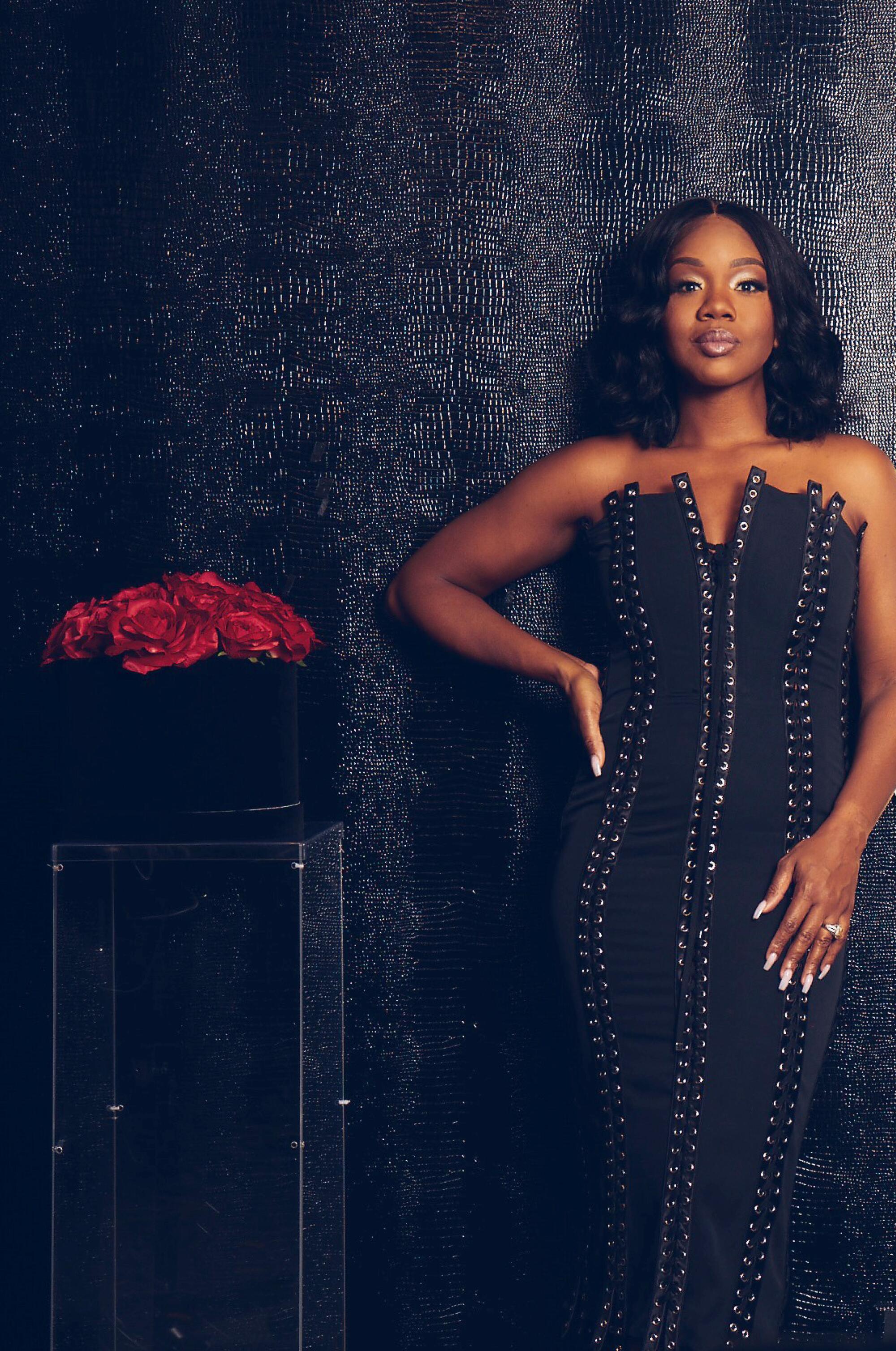
When it comes to the word, Roberts likes to put herself in the shoes of specific characters in the Bible and empathize with their plight or challenges. Her sensibility feels very down to earth. I ask Roberts about her process. The first person she looks at is herself, and that leads her to what needs to be said. “Spiritually, for me, I have to look at the governments of my own life.”
Los Angeles artist Jaraé Holieway initially discovered Roberts on YouTube in 2020. “Her flow, the rhythm at which she speaks, the cadence in her delivery … it’s very warm, very welcoming. It feels very motherly. It feels like a sister, like a friend. It’s very real; it’s very raw. Then she hits you with a word.”
In other words, what she’s saying feels honest, Holieway says. “I could tell it’s coming from the heart. It’s coming from the spirit. It’s very real. It’s very vulnerable. It’s genuine and it doesn’t feel manicured. It doesn’t feel too polished. It feels very raw. And she’s not afraid to shake the room.
“Sis is not afraid to shake the room.”
Roberts is often pegged as a “modern Christian woman” — a fraught term that, Touré told me, is really about “perception.” “I think that she is satisfying a hunger, in culture, for authenticity, for spirituality,” Touré says. “Some of the old mentalities about what it means to be a woman, or a Christian woman, needed to die. And so when she says she’s a modern woman of faith, she’s saying, ‘I am the authentic current expression of what a woman of faith could look like.’ So I think it’s about really shattering stereotypes and walls that have been put up there. And quite frankly, it’s a redefining of what you think a Christian should look like.”
In June, I went to see Sarah Jakes Roberts on the road in Columbus, Ohio, at the Women Evolve Revolution tour. The Revolution tour stopped at the Palace Theater downtown the day after Beyoncé released “Break My Soul” from “Renaissance,” just a few days before the Supreme Court overturned Roe v. Wade. As I walked into the theater, D4L’s “Laffy Taffy” played over the loudspeakers. Pastor Touré was in the front row with the family. (He was at all seven tour stops.) Face masks were required when sitting. I expected the night to feel like the camp revivals I used to frequent with my grandma that ended somewhere around 1 o’clock in the morning.
The message of the night was anchored by a question: what is happening in our lives that has made us less potent, less able to establish goodness and light on earth?Roberts walked the crowd throughout the evening — she was both emcee and preacher — with her usual energy and charisma. When she put on her moderator hat, she showed why this was a night for transformation. Onstage, she spoke about the importance of annual health screenings with a representative of Black Women’s Health Initiative and Dr. Anita Phillips, a trauma therapist who joined Roberts on every tour stop.When Roberts delivered her sermon she spoke about being bold enough to reach for the healing that you want. Her message resonated. Some people shouted “Sarah!” Others clapped. People made videos of her on their phones. It felt communal, as church does.
It also felt personal: She was there for the women in the room. For women who were made to feel ashamed of their bodies or clothes, told to “cover up.” For the women who felt that their lives were too often subjected to judgment. Watching Roberts in action, I was reminded, despite church attendance being down, how there existed — specifically among Black women — a strong desire to deepen their relationship to spirituality.
Central to Roberts’ project — the podcast, Facebook Live, sermons and Women Evolve — is helping women understand something she learned through experience: that in the church there is space for them to be who they are. She has made it her mission to empower women inside and outside the church through culture.“The church has been so committed to demonizing things that we don’t understand or things that we don’t want to see multiplied, that we don’t honor the gift in it. And I think that’s where people struggle,” Roberts says. “It’s like, you can tell me rap is bad, but he just spit those bars. Let’s be 100 about it. And I think to be able to honor the gift that someone possesses, even if maybe we don’t agree with their lifestyle, or agree with the words that they’re using to demonstrate it, I think that when you completely throw someone out, that it makes us internalize, ‘Well ... I kind of like that. So maybe there’s something wrong with me.’ ”
Back at her office in Southern California, I asked her about the lens through which she views the role of culture in her work — as a woman of faith, a preacher, inspirational speaker, businesswoman. “I think to be in the culture is to vacillate between what you think is true and what you think is false, and what’s right or what’s wrong. Your mind is constantly changing, because there’s something else being added into the pot all the time,” she says. “I think my job, my role, is to be able to watch the pot, to be in it, but to not let what’s happening get inside of me to remind myself what my truth is.”
More stories from Image

